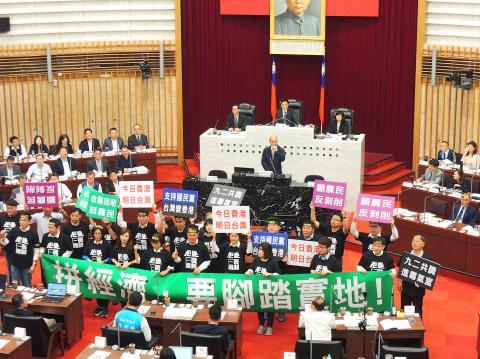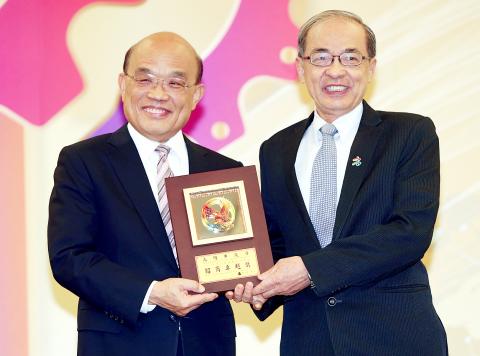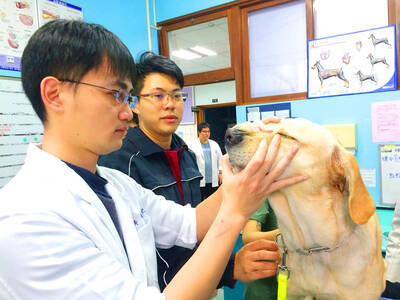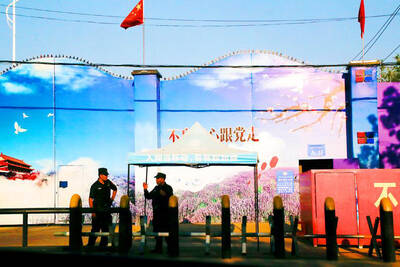Premier Su Tseng-chang (蘇貞昌) yesterday denied that a video he posted showing highlights of Thursday’s Executive Yuan meeting was meant to show Kaohsiung Mayor Han Kuo-yu (韓國瑜) in a bad light.
The video, posted on Su’s Facebook page, included an introduction that showed Su asking Han not to refer to Taiwan as “an area,” after remarks he made on mass protests in Hong Kong against a proposed extradition bill and other issues.
Han earlier yesterday said that he thought Su’s video was “inappropriate.”

Photo: Wang Jung-hsiang, Taipei Times
“Since he [Su] took office, he has been going on about how the Kaohsiung mayor has never attended a Cabinet meeting,” Han said. “So I went, and he edited a video to put on the Internet to attack and criticize me.”
“By going, we were trying to be very polite and sincere in requesting the Executive Yuan’s help with Kaohsiung’s development,” he added.
In response, Su said it was not the first — nor would it be the last — video of the weekly Cabinet meeting he uploaded, adding that the videos of the 18 meetings held since he assumed office had all been edited and uploaded for everyone to see.

Photo: CNA
“The government must report to the people what it has done for them. Through the video we hope to call on people to join us in doing what they should do,” he said on the sidelines of an event in Taipei ahead of Police Day today, with police officers receiving awards for excellent performance.
“This is the government’s responsibility and its continuing job. [Han] does not need to distort this,” he added.
The video also showed Su tallying subsidies the Cabinet had disbursed to the Kaohsiung City Government — a source of contention with Han, who has accused the Democratic Progressive Party of plotting to derail his administration, including by denying it funds for the development of the municipality.
The Kaohsiung Department of Health on Tuesday last week asked for NT$10.7 million (US$339,359) to combat a dengue fever outbreak, and the Cabinet dispersed the subsidy on Thursday last week, Su said.
The central government has agreed to give NT$80 billion toward the construction of a yellow line for the Kaohsiung Mass Rapid Transit (KMRT) system; NT$105 billion for the relocation of Dalinpu Village (大林蒲) residents; and NT$27 billion to extend the KMRT system from Gangshan District (岡山) to Lujhu District (路竹).
The central government has over the past three years given the Kaohsiung City Government NT$247.6 billion in “cold, hard cash,” which shows that the government’s bid to push for Kaohsiung’s development transcends partisan politics, Su said, urging Han “not to misunderstand.”
Su also spoke about the Hong Kong protests.
When the British lease for Hong Kong expired, China said that it would allow the territory 50 years of autonomy under a “one country, two systems” framework, Su said.
“Look at what has happened now... Police firing into the crowd. A group of officers hitting a civilian who had already fallen to the ground. All of these shocking and disturbing events are passing before the eyes of Taiwanese, of the international community,” he said.
“While an authoritarian country knows only authoritarian rule, Taiwan’s democracy is the fruit of the sacrifices and persistence of many generations,” Su added.

Former Czech Republic-based Taiwanese researcher Cheng Yu-chin (鄭宇欽) has been sentenced to seven years in prison on espionage-related charges, China’s Ministry of State Security announced yesterday. China said Cheng was a spy for Taiwan who “masqueraded as a professor” and that he was previously an assistant to former Cabinet secretary-general Cho Jung-tai (卓榮泰). President-elect William Lai (賴清德) on Wednesday last week announced Cho would be his premier when Lai is inaugurated next month. Today is China’s “National Security Education Day.” The Chinese ministry yesterday released a video online showing arrests over the past 10 years of people alleged to be

THE HAWAII FACTOR: While a 1965 opinion said an attack on Hawaii would not trigger Article 5, the text of the treaty suggests the state is covered, the report says NATO could be drawn into a conflict in the Taiwan Strait if Chinese forces attacked the US mainland or Hawaii, a NATO Defense College report published on Monday says. The report, written by James Lee, an assistant research fellow at Academia Sinica’s Institute of European and American Studies, states that under certain conditions a Taiwan contingency could trigger Article 5 of NATO, under which an attack against any member of the alliance is considered an attack against all members, necessitating a response. Article 6 of the North Atlantic Treaty specifies that an armed attack in the territory of any member in Europe,

LIKE FAMILY: People now treat dogs and cats as family members. They receive the same medical treatments and tests as humans do, a veterinary association official said The number of pet dogs and cats in Taiwan has officially outnumbered the number of human newborns last year, data from the Ministry of Agriculture’s pet registration information system showed. As of last year, Taiwan had 94,544 registered pet dogs and 137,652 pet cats, the data showed. By contrast, 135,571 babies were born last year. Demand for medical care for pet animals has also risen. As of Feb. 29, there were 5,773 veterinarians in Taiwan, 3,993 of whom were for pet animals, statistics from the Animal and Plant Health Inspection Agency showed. In 2022, the nation had 3,077 pediatricians. As of last

XINJIANG: Officials are conducting a report into amending an existing law or to enact a special law to prohibit goods using forced labor Taiwan is mulling an amendment prohibiting the importation of goods using forced labor, similar to the Uyghur Forced Labor Prevention Act (UFLPA) passed by the US Congress in 2021 that imposed limits on goods produced using forced labor in China’s Xinjiang region. A government official who wished to remain anonymous said yesterday that as the US customs law explicitly prohibits the importation of goods made using forced labor, in 2021 it passed the specialized UFLPA to limit the importation of cotton and other goods from China’s Xinjiang Uyghur region. Taiwan does not have the legal basis to prohibit the importation of goods